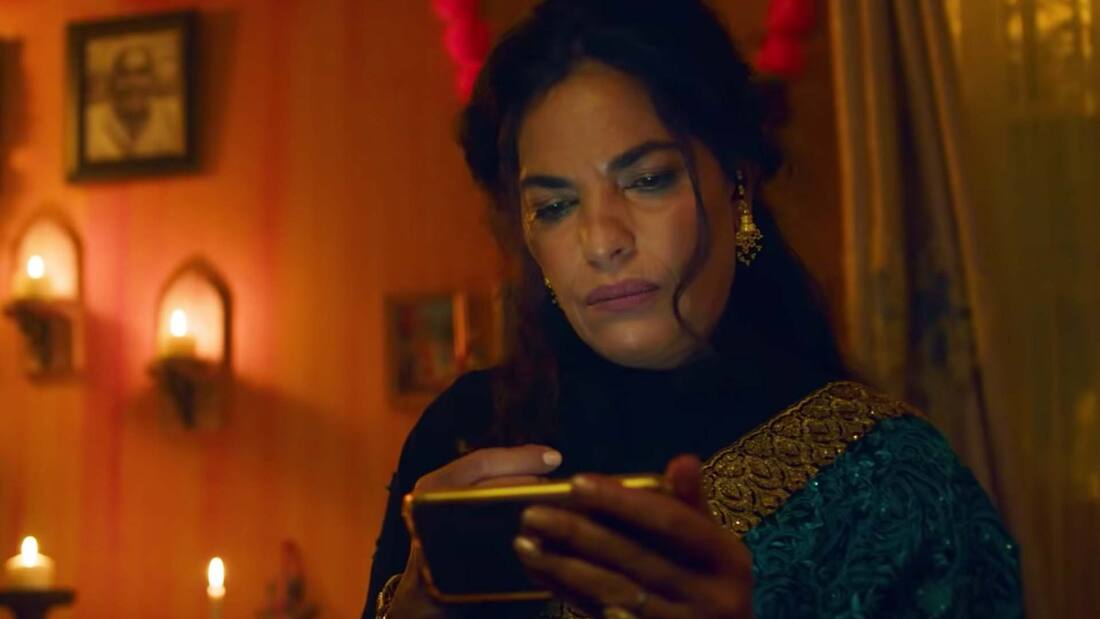|
By Nadia Dalimonte Sarita Choudhury in Evil Eye (2020) “I guess it’s hard to really know someone, right?”
Evil Eye has an intriguing supernatural premise, women leading the story, and refreshing cultural specificity. But the potential on the page never really clicks on screen in an effective way. The film is a sporadically fun watch led by Sarita Choudhury’s strong performance, which is unfortunately weighed down by Elan and Rajeev Dassani’s lackluster set up. The filmmakers adapted the story from an Audible Original by playwright Madhuri Shekar. Evil Eye could’ve been a great supernatural thriller, but it’s a film that reveals all its tricks early on and then slow burns in circles to reach an inevitable confrontation. The highlight is Choudhury, who gives it her absolute all to evoke a constant feeling of anxiety on a level that the film surrounding her can’t reach. She plays Usha, a traditional Indian mother who is convinced that her daughter’s new boyfriend is the reincarnation of a man who tried to kill her 30 years ago. Usha’s belief in reincarnation and curses are rooted from her personal experiences that still feel fresh with the passing of time. The filmmakers makes it very clear that her growing suspicions will align with the introduction of this new boyfriend, which leaves no room for surprises and instead starts the countdown to when this man will reveal his true intentions. In the meantime, Usha’s relationship with her daughter Pallavi (Sunita Mani) takes center stage. The two are very close from the beginning, constantly on the phone to each other. The majority of the film plays out through phone calls, as Usha lives with her husband in India while Pallavi lives in the U.S. Pallavi, nearing 30 without a husband, spends a lot of time fielding her mother’s concerns about finding a partner. It’s a universal talking point that grounds the film, especially considering Mani and Choudhury have wonderful chemistry that never wavers. But there is more on Usha’s mind, and because of the abusive experience she had as a young woman, she is an especially protective parent determined to get rid of a curse. She believes in the evil eye and that it (in the form of a bracelet) will protect Pallavi from harm. When Pallavi runs into a handsome man named Sandeep (Omar Maskati) at a coffee shop and the two begin dating, her excitement at everything going so well is met with Usha’s immediate suspicions that this is all too good to be true. To show where the suspicions are coming from, the filmmakers use flashbacks from Usha’s painful experience with an abusive ex-boyfriend who wouldn’t leave her alone. Each flashback is aligned with a present-day sign Usha recognizes in Sandeep’s behaviour. She grows more and more convinced that he’s the reincarnation of the man who abused her. Her concerned husband tries to reassure her she has nothing to fear, to no avail. Pallavi laughs off her mother's threats, all the while there are red flags galore at the one-month point of their relationship. The expensive gifts, Sandeep wanting her to quit her job and move in together, swooping in “for her own good”. The character of Sandeep has all the ingredients of an obvious villain exposed as potentially sinister from the very beginning. While Maskati is fine in the role, he’s playing someone who never deviates from a literal path, and so much of the film is simply waiting for him to do exactly what Usha said would happen. The final act is a tense one, but also void of surprises and feels unfortunately rushed. Evil Eye tries to build suspense in a slow-burning way to reach a showdown, losing energy in the process. The film works best as a mother-daughter drama about emotional recovery that dictates the fear of history repeating itself generationally. The chemistry between Sarita Choudhury and Sunita Mani totally carries the film, and proves to be far more interesting to watch unfold than the film's supernatural premise.
0 Comments
Leave a Reply. |
Archives
June 2024
Categories |


 RSS Feed
RSS Feed